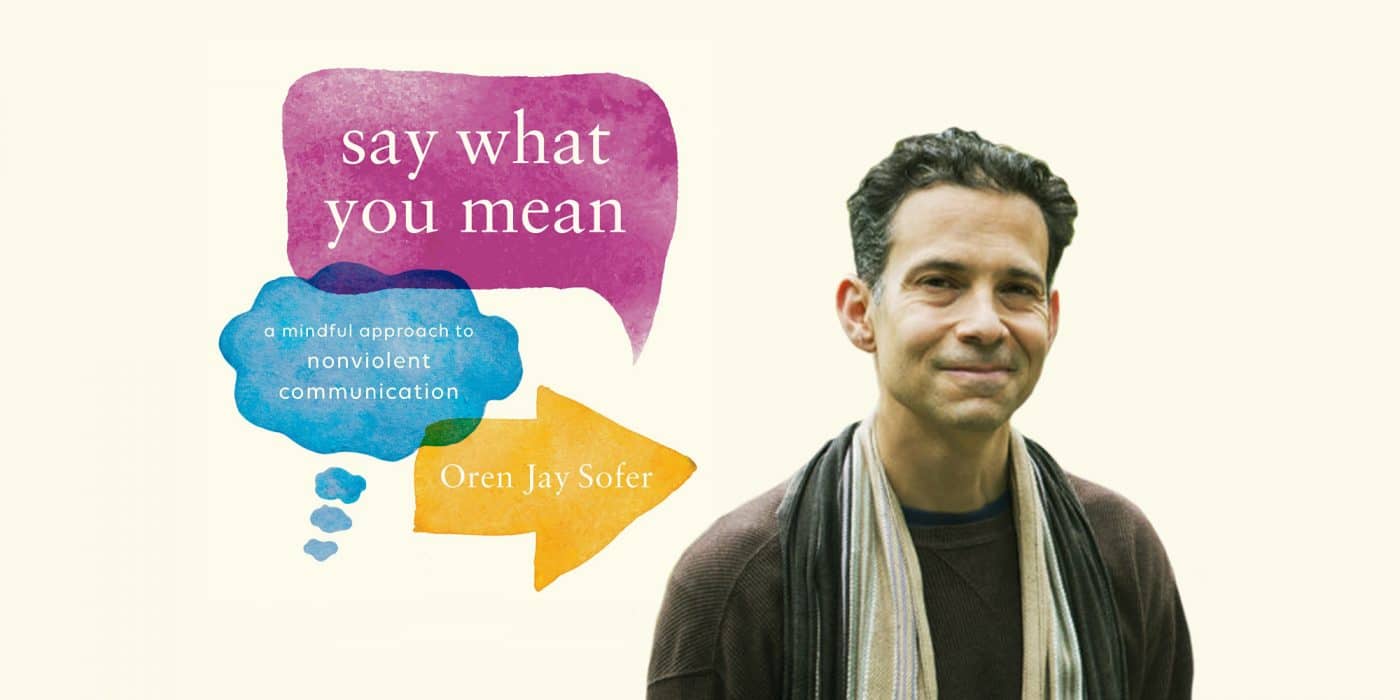Say What You Mean: A Mindful Approach to Nonviolent Communication
by Oren Jay Sofer
Book Review by Amy Kellestine
We are not born with the skills for rich and nuanced verbal conversations. As we grow, so does our ability to communicate using words and tone as well as body language. However, other than learning grammar and punctuation, most of us spend precious little of our lives exploring the art of truly effective communication.
Author and teacher Oren Jay Sofer is poised to remedy that with “Say What You Mean: A Mindful Approach to Nonviolent Communication”. In it he writes, “Words are woven into the fabric of our lives.” Sofer masterfully weaves together a stunning tapestry of mindfulness, somatics, and nonviolent communication.
Sofer has practiced meditation in the Theravada Buddhist tradition since 1997 and is a Somatic Experiencing practitioner and certified Trainer of Nonviolent Communication. His vast knowledge and experience of each topic, as well as his time as a workshop and retreat leader, shine through with this fresh and groundbreaking take on effective communication.
The book is structured around the three steps he offers for effective conversations: lead with presence, come from curiosity and care, and focus on what matters. The final chapter offers a number of strategies for tying each of these steps together in the “real world” of interacting with others. Each chapter includes practices to apply the concepts presented in the text and concludes with a summary of the principle and key points, and a sampling of relevant questions with answers. Even more handy is the summary of all the principles, useful communication phrases, glossary, index of practices, and additional references included at the conclusion of the text as well as the audio resources available on Sofer’s website.
With anecdotes from his own painful failed communication efforts, lessons from friends, students and fellow teachers, and thoughtful quotes, Sofer brings new light to the true power of mindfulness and setting your intention. He also demonstrates how to stop playing the blame game and get to the root of your true needs, and how to prevent strong emotions from derailing your ability to connect. He repeatedly illustrates how increasing understanding and compassion for yourself can pay huge dividends when wanting to be heard and understood by others.
I found the descriptions of embodied sensations throughout the book to be rich and nuanced. For example, Sofer describes somatic feelings of “being grounded or clear”, “settled clarity”, and “have a feeling of open spaciousness, an inner alignment, or a sense of energy and vitality.” However, these sensations might be foreign for newcomers to mind-body awareness. He does briefly suggest that it might be helpful to work with a communication buddy or seek empathy from a friend or mentor. Yet I believe a stronger emphasis in the introduction on the value of seeking out qualified practitioners would make this content more accessible to those unfamiliar with somatic practices and sensations.
“Say What You Mean”’s 300 pages convey a vast amount of impactful information. Despite my familiarity with the concepts and many of the practices, it still felt like trying to drink from a firehose at times. While easy to read in the moment, it could take months or even years of practice to effectively apply the teachings. I believe readers of all skill levels would be well served to heed his advice of using the book as “a field guide for conversations” and to take “time to integrate each section as you read.”
This book intriguingly synthesizes and links three very influential bodies of knowledge together and speaks to the power for growth and transformation when we are truly being heard. It would be a great addition to anyone’s personal library—regardless of where they are on their journey for understanding themselves and communicating more effectively with others.












